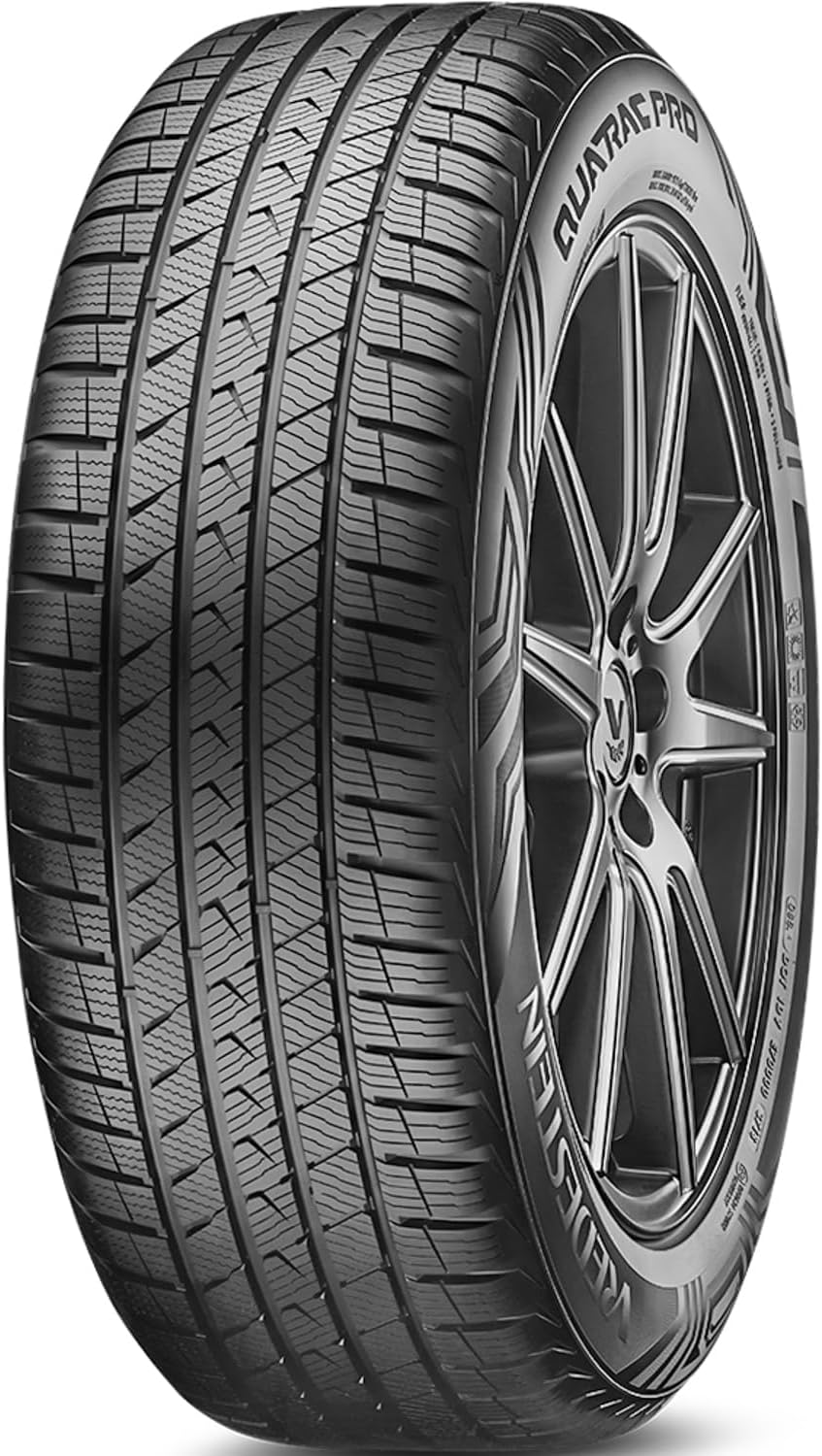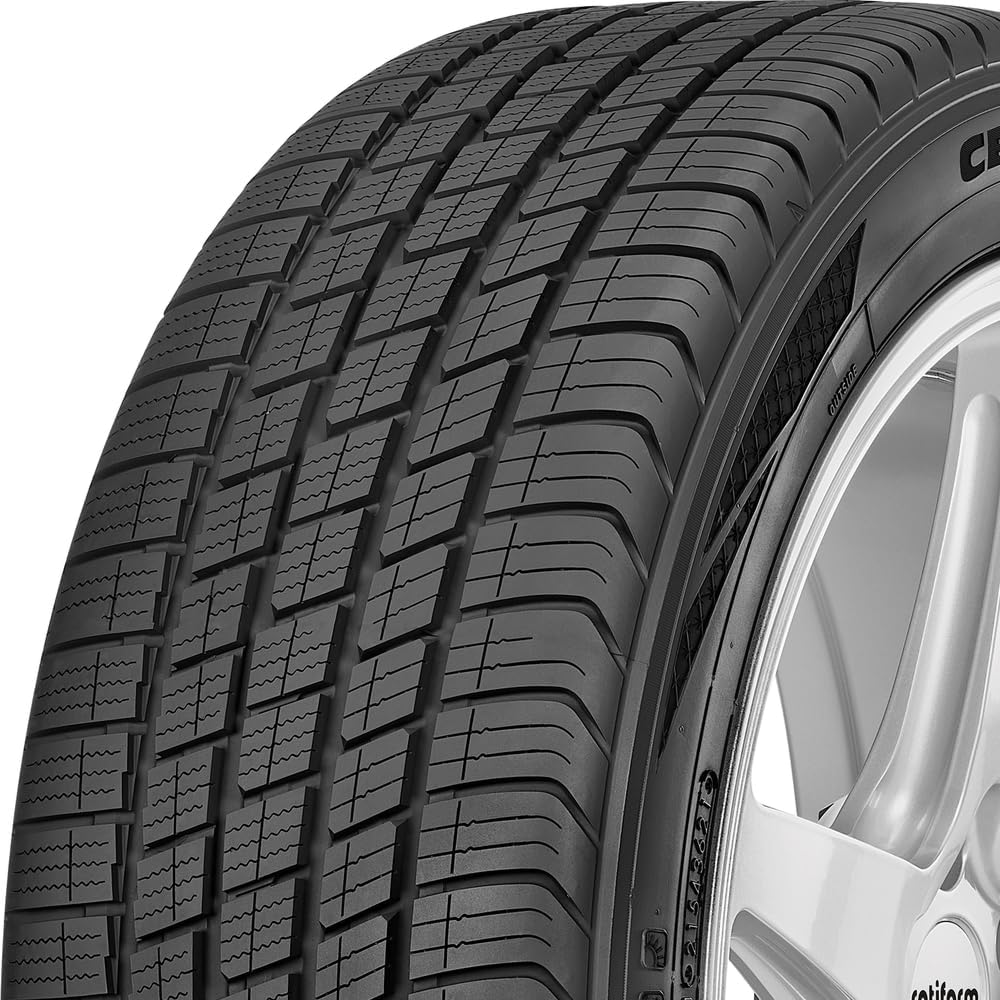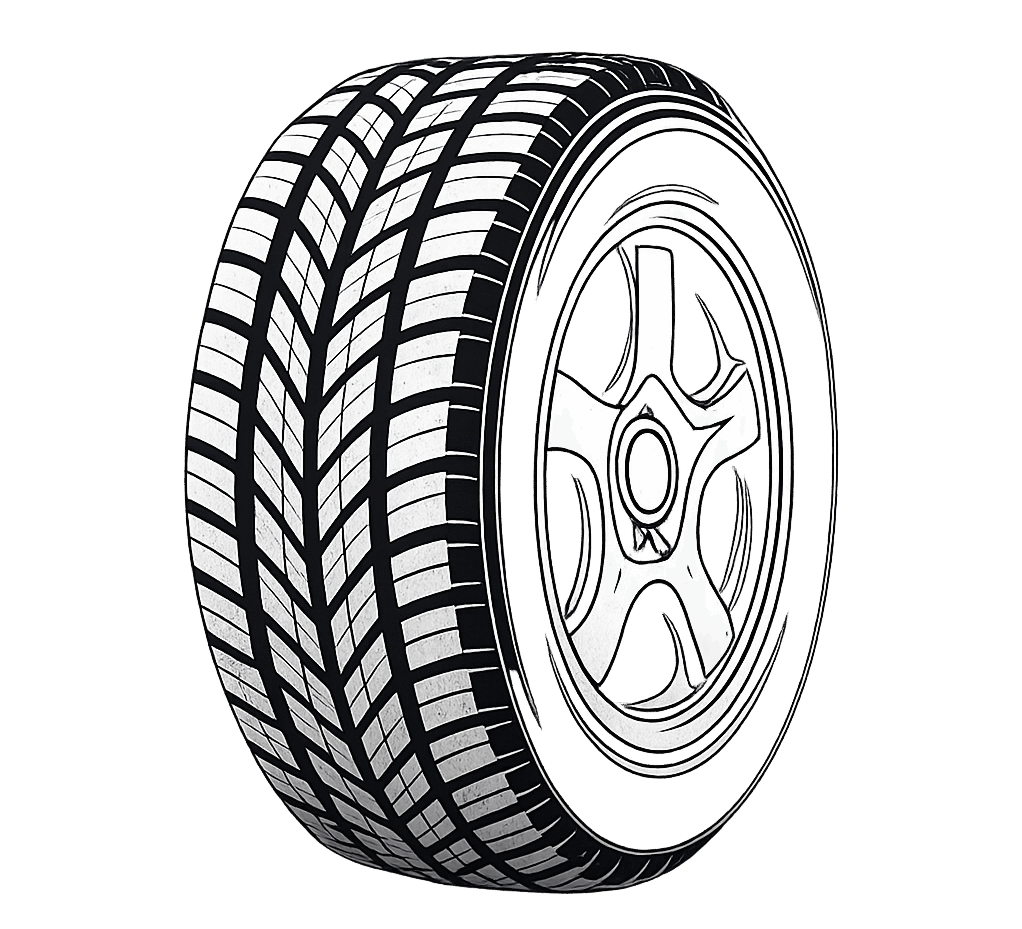Best All Weather Tires for SUV (2025) – Expert Picks
Last updated on September 20th, 2025
Tired of swapping tires every season? If you drive an SUV and want one set of tires that handles rain, slush, and even light snow, all-weather tires are your solution. They carry the Three-Peak Mountain Snowflake (3PMSF) symbol, meaning they’re tested for winter traction, yet they’re built to last year-round.
In this guide, I’ll walk you through the best all weather tires for SUV in 2025, explain what makes them different from all-season and winter tires, and help you decide which one is right for your climate and driving style.
Quick Picks
- Best Overall: Michelin CrossClimate 2 SUV — balanced performance in rain, dry, and snow.
- Best Budget-Friendly: Vredestein Quatrac Pro — sporty feel, great price.
- Best for Cold Climates: Nokian WR G4 SUV — excellent winter grip with year-round durability.
What Are All-Weather Tires?
All-weather tires are designed to deliver consistent performance in a variety of weather conditions throughout the year. Unlike all-season tires, which may struggle in harsher winter conditions, or winter tires that excel only in snow, all-weather tires offer year-round versatility without needing to swap them seasonally. They come with the 3PMSF (Three-Peak Mountain Snowflake) symbol, which means they’ve been tested and approved for performance in snow.
Why Choose All-Weather Tires?
Let’s face it—weather can be unpredictable. One day it’s sunny, the next day you’re driving through rain or even light snow. That’s where all-weather tires come in handy.
Unlike all-season tires, which are mainly designed for mild conditions, all-weather tires are built to handle a little bit of everything—heat, rain, slush, and light snow. They’re kind of like the Swiss Army knife of the tire world.
Real-Life Example:
Imagine you live in a place like Denver, Colorado. One morning it’s dry and warm, but by evening there’s a snow flurry. With all-weather tires for your SUV, you don’t need to swap tires every season. You’re good to go all year long.
Key Benefits:
- Year-round traction: All-weather tires grip well in both summer heat and winter chill.
- Certified for winter: Most of them have the 3PMSF symbol (Three-Peak Mountain Snowflake), meaning they’re approved for light to moderate winter conditions.
- No seasonal change needed: Save time, money, and garage space by skipping the winter-summer swap.
- Peace of mind: You’re always ready, no matter what the forecast says.
Quick Tip:
If you often face heavy snow or icy roads, all-weather tires are better than all-season—but not as strong as dedicated winter tires. So, if you live in a place like Minnesota, you might still want snow tires for deep winter.
In short, all-weather SUV tires are perfect for people who want safety, convenience, and performance—without the hassle of changing tires twice a year.
What Do You Need To Know Before Looking for the Best All Weather Tires for SUV?
✅ 1. Look for the 3PMSF Symbol: This symbol proves the tire is certified for real winter driving. If a tire doesn’t have it, it’s not truly all-weather.
✅ 2. All-Season vs. All-Weather: All-season tires aren’t built for snow. All-weather tires have the flexibility and grip for light winter conditions.
✅ 3. Know Your Climate: All-weather tires are perfect for areas with mild to moderate winters. If you face deep snow or ice regularly, consider winter tires instead.
✅ 4. Tread Life & Warranty: Look for tires with at least a 50,000-mile treadwear warranty and good reviews on real-world durability.
✅ 5. Match Your Driving Style: Want comfort? Look for touring. Like control? Go sporty. Drive rough roads? Get reinforced sidewalls.
How We Chose These Tires
We know that choosing the right tire can feel overwhelming, so we wanted our list to be clear, fair, and helpful. To make sure of that, we looked at information from trusted places like manufacturer websites, Tire Rack, Car & Driver, and Consumer Reports. These sources give us real test results and honest reviews.
When deciding which tires made the cut, we focused on the things that matter most for everyday SUV drivers:
- Safety – How well the tire grips the road in rain, snow, or dry conditions.
- Traction – Whether the tire can stop quickly and handle sharp turns.
- Tread life – How long the tire is expected to last before needing replacement.
- Comfort – Whether the ride feels smooth and quiet.
- Price – Making sure you get good value for the money.
- Warranty – Extra peace of mind from the manufacturer.
We compared dozens of tire models and narrowed them down to five that performed the best across these areas. These five offer a strong mix of safety, reliability, and value, making them smart choices for SUV owners in 2025.
By being open about how we picked these tires, we want you to feel confident that the list is based on real research—not just opinion.
Quick Comparison Table of Top 5 All Weather Tires for SUV
| Tire | Category | 3PMSF | UTQG / Treadwear | Warranty (Miles) | Price Range (USD) | Best For |
| Michelin CrossClimate 2 SUV | Premium Touring | ✔ | 640 A A | 60,000 | $200–$320 | Mixed climates, long tread life |
| Vredestein Quatrac Pro | Performance | ✔ | 400 A A | 50,000 | $160–$260 | Sporty handling, quiet ride |
| Goodyear Assurance WeatherReady | Touring | ✔ | 700 A A | 60,000 | $140–$250 | Comfort + wet/slush safety |
| Nokian WR G4 SUV | Nordic All-Weather | ✔ | 500 A A | 55,000 | $170–$300 | Cold climates, snow/slush grip |
| Toyo Celsius Sport | Performance | ✔ | 420 A A | 50,000 | $150–$260 | Sporty SUVs, dry + wet stability |
5 Best All Weather Tires for SUV
1. Michelin CrossClimate 2 SUV
Category: Premium All-Weather Touring Tire
This tire is a superstar in the all-weather category. It blends the comfort and quiet ride of a premium touring tire with the winter traction of a snow tire. It’s also one of the few all-weather options that performs like a champ in both dry and snowy conditions.

What it’s best for:
Drivers who want one tire that does it all—excellent handling in rain, snow, and dry roads.
Key performance highlights:
- 3PMSF-rated for real winter capability
- Confident braking on wet and snowy roads
- Long tread life for year-round reliability
- Smooth and quiet ride on the highway
Pros:
✔ Top-rated wet and snow performance
✔ Long tread life and consistent handling
✔ Great for all types of weather
Cons:
✘ Slightly higher price point
Ideal use cases:
- Year-round commuting
- Mixed weather areas
- City and highway driving
- Light snow and slushy roads
2. Vredestein Quatrac Pro
Category: Performance All-Weather Tire
The Vredestein Quatrac Pro is a stylish, high-performing all-weather tire designed for modern SUVs and crossovers. It’s 3PMSF-certified, meaning it’s ready for winter, but it also delivers a sporty and responsive feel on dry roads.

What it’s best for:
Drivers who live in areas with mild winters and wet weather, and want more control and responsiveness.
Key performance highlights:
- 3PMSF-rated for dependable winter traction
- Excellent control in both rainy and dry weather conditions.
- Low road noise and smooth ride
- Sleek tread design for water drainage and grip
Pros:
✔ Sporty and stable ride
✔ Quiet and comfortable
✔ Excellent wet and dry grip
✔ More affordable than other premium options
Cons:
✘ Not the best choice for heavy snow or icy surfaces
✘ Tread life is average
Ideal use cases:
- City and highway driving
- Wet and rainy climates
- Light snow
- Daily use for performance-oriented SUVs
3. Goodyear Assurance WeatherReady
Category: All-Weather Touring Tire
The Goodyear Assurance WeatherReady is a dependable all-weather tire that really shines in wet and slushy conditions. It’s built for year-round safety, with a focus on traction, comfort, and peace of mind in unpredictable weather.

What it’s best for:
Drivers who want a tire that handles rain, dry pavement, and occasional snow—especially if you don’t want to worry about tire changes.
Key performance highlights:
- 3PMSF-rated for winter traction
- Evolving tread grooves for consistent grip
- Excellent hydroplaning resistance
- Smooth, comfortable ride
Pros:
✔ Strong wet and snow performance
✔ Comfortable and quiet
✔ Long-lasting tread
✔ Good warranty coverage
Cons:
✘ Less sporty feel
✘ Not for extreme winter
Ideal use cases:
- Daily commuting
- Rainy and slushy roads
- Mild winter climates
- Long highway drives
4. Nokian WR G4 SUV
Category: Nordic-Inspired All-Weather Tire
The Nokian WR G4 SUV is like having a winter tire and an all-season tire rolled into one. Built by a company known for making top-tier winter tires, this option brings serious snow confidence without sacrificing dry-road comfort.

What it’s best for:
Drivers in colder regions with snow, ice, rain, and everything in between—who want one tire all year long.
Key performance highlights:
- 3PMSF-certified for real winter use
- Excellent slush and snow grip
- Responsive in dry conditions
- Reinforced sidewalls for durability
Pros:
✔ Great snow and slush handling
✔ Durable and road-tough
✔ Quiet and comfortable ride
Cons:
✘ Not as sporty on dry pavement
✘ Availability may vary
Ideal use cases:
- Snowy and icy climates
- Cold weather commuting
- Urban roads with potholes or rough patches
5. Toyo Celsius Sport
Category: Performance All-Weather Tire
The Toyo Celsius Sport is a sporty, all-weather tire built for SUVs that want a little more pep. It’s 3PMSF-certified and delivers sharper handling and cornering than your average all-weather option.

What it’s best for:
Drivers who want solid winter traction but still care about how their SUV feels on dry roads.
Key performance highlights:
- 3PMSF-rated for winter readiness
- Aggressive tread for strong grip
- Strong braking and cornering on dry pavement
- Sleek, modern tread design
Pros:
✔ Sporty and responsive ride
✔ Confident cold-weather performance
✔ Excellent wet and dry traction
Cons:
✘ Slightly firmer ride
✘ Tread life is average
Ideal use cases:
- Sporty SUVs and crossovers
- Mild to moderate winters
- Mixed city and highway driving
Buying Guide: How to Choose the Best All Weather SUV Tires
Not all all-weather tires are the same, and what works for one driver may not work for another. Here are the key things to look at before buying:
Know Your Driving Conditions
Ask yourself:
Do you deal with rain, light snow, or dry roads most of the time?
If you drive in areas with changing weather—like Seattle or upstate New York—then all-weather tires are a smart choice. They handle wet roads, light snow, and dry pavement without a problem.
Tip: If your winters are harsh and icy, you may still need dedicated winter tires.
Tread Pattern & 3PMSF Certification
The tread is the part of the tire that touches the road. A good tread pattern helps move water, snow, and slush away so you don’t lose grip. Look for the Three-Peak Mountain Snowflake (3PMSF) symbol on the side of the tire. This means the tire has been tested for real winter conditions and will give you better traction when the weather gets rough.
Warranty & Lifespan
Tires can be a big investment, so you’ll want them to last. Most tire makers give a mileage warranty, such as 60,000 miles. This means the company expects the tire to last that long under normal driving. For example, Michelin’s CrossClimate 2 SUV comes with up to a 60,000-mile warranty. A longer warranty usually means better value.
Price vs. Performance Trade-offs
Some tires cost more because they offer better grip, longer tread life, or a smoother ride. Budget-friendly tires may save you money upfront, but they might wear out faster. Think about how long you plan to keep your SUV and how often you drive. Spending a little more now could save you money in the long run.
Noise & Comfort Ratings
All-weather tires are designed to handle tough conditions, but some are quieter than others. Check customer reviews to see if people mention road noise. If you spend a lot of time on highways, a tire that runs quietly and gives a smooth ride will make your trips more enjoyable.
SUV-Specific Needs
SUVs are heavier than cars, which means they need tires that can handle the extra weight. Look for tires with the right load rating (how much weight they can carry safely). Also, think about handling. If you drive in the city most of the time, comfort might matter more. If you take your SUV on mountain roads, you’ll want a tire that grips well in turns.
By keeping these factors in mind, you can pick a set of all-weather tires that fits your budget, driving style, and local climate.
Where to Buy & Price Guide
Top retailers to consider:
- Tire Rack — Large selection, frequent independent test results.
- Discount Tire — Local installation options.
- Walmart / Amazon — Affordable, accessible.
- Local Dealers — May include installation and warranty packages.
Average pricing for all-weather SUV tires: $140–$320 per tire depending on brand and size.
Read More: Goodyear vs Michelin (2025) — Which Tire Brand Should You Choose?
All-Weather vs. All-Season Tires: What’s the Difference?
You’ve probably heard both terms—all-season and all-weather—and thought they meant the same thing. But they’re actually pretty different.
Let’s break it down in simple terms.
🚗 All-Season Tires: Good for Mild Weather
All-season tires are designed for places with mild winters. They work well in spring, summer, and fall, and even light winter.
But here’s the catch:
They get stiff in cold temperatures and don’t grip well on snow or ice. That’s because their rubber compound is made for warmer weather.
Real Example: If you live in Los Angeles or Houston, where winters are warm and dry, all-season tires are just fine.
❄️ All-Weather Tires: Built for Every Season
All-weather tires are like an upgrade. They handle everything all-season tires can, but they also work in cold weather, light snow, and slush.
That’s why many of the best all weather tires for SUVs—like the Michelin CrossClimate 2 or Vredestein Quatrac Pro—have the 3PMSF symbol (Three-Peak Mountain Snowflake). This means they’re approved for winter use.
Quick Tip: If you live in a place like Chicago or Portland, where weather changes a lot, all-weather tires are the safer bet.
🔍 Key Differences at a Glance
| Feature | All-Season Tires | All-Weather Tires |
|---|---|---|
| Warm Weather Grip | ✅ Great | ✅ Great |
| Wet Road Performance | ✅ Good | ✅ Very Good |
| Winter Traction | ❌ Limited | ✅ Good (3PMSF Rated) |
| Temperature Range | 45°F and above | All temperatures |
| Ideal for | Mild climates | Changing or unpredictable climates |
If your area never gets snow, all-season tires may work just fine. But if you face rain, cold, or occasional snow, all-weather tires are the smarter choice—especially for your SUV.
Think of it like this:
- All-season tires are like sneakers.
- All-weather tires are like waterproof hiking shoes—you’re ready for anything.
Conclusion
Each of these top five all-weather tires offers year-round performance with true winter capabilities, thanks to the 3PMSF symbol. Whether you’re after a quiet ride, sporty control, or peace of mind in unpredictable weather, there’s a tire here that fits the bill.
You don’t need to change your tires every season to stay safe—you just need the right set. Choose the one that matches your SUV and your lifestyle, and enjoy a safer, smoother ride in 2025 and beyond.
FAQs
1. Are all-weather tires good for SUVs?
Yes — they balance year-round safety, making them ideal for SUVs in mixed climates.
2. Can I use all-weather tires instead of winter tires?
If you drive in heavy snow or ice daily, winter tires are still best. Otherwise, all-weather tires work well.
3. How long do all-weather tires last?
Most last 50,000–60,000 miles, depending on driving style and rotations.
4. What does 3PMSF mean?
The Three-Peak Mountain Snowflake symbol shows the tire meets winter traction standards.
5. Are all-weather tires noisy?
Touring models are generally quiet; performance models may hum more.
6. Do I need to replace all four tires?
Yes, especially with AWD SUVs, to avoid drivetrain stress.
7. What’s the difference between all-weather and all-season tires?
All-weather = snow-certified. All-season = not safe in heavy snow/ice.
8. How often should I rotate my tires?
Every 5,000–7,500 miles, or as recommended by your vehicle manual.
9. Do all-weather tires hurt fuel economy?
Not significantly. Rolling resistance is slightly higher than summer tires, but minimal for most drivers.
10. Where should I buy them?
Tire Rack, Discount Tire, and Walmart/Amazon are reliable options.








